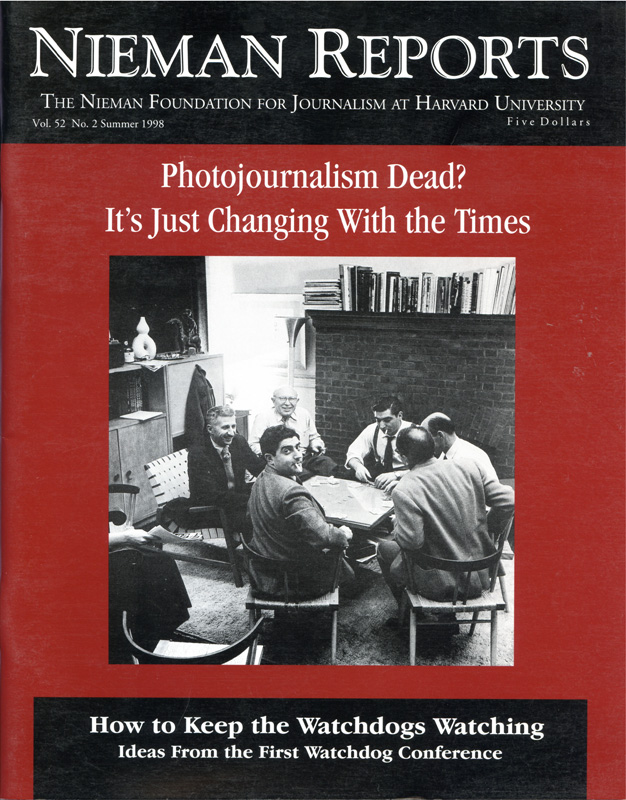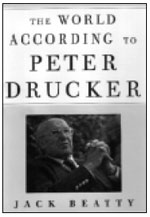“Born to see; meant to look.” That’s the personal motto taken from Goethe’s “Faust” that Peter Drucker, the legendary thinker and management expert, uses to describe his profession. An observer, not a participant. Almost like a journalist. But not quite. Drucker likes to call himself a writer, a “social ecologist,” someone whose beat is organizations, maybe even groups, like workers or management. Ideas, too, the ones that have been percolating around in politics, economics and literature since the early years of the 20th Century.
A birds-eye view of Drucker’s observations can be found in a recent survey of his intellectual history, “The World According to Peter Drucker,” by Jack Beatty, a top Atlantic Monthly editor and author of “The Rascal King,” a biography of former Boston Mayor James Michael Curley.
Journalists everywhere could do well to read about Drucker. His books and essays are provocative and incisive about human nature and history. He’s had many scoops that most of us would kill to have printed first.
In 1969 he predicted that the information industry would transform American society. “Certainly young people…will use information systems as their normal tools, much as they now use the typewriters and the telephone,” he wrote.
“The essence of the knowledge society is mobility in terms of where one lives, mobility in terms of what one does, mobility in terms of one’s affiliation.” That was 30 years before the telecommunications revolution allowed people to live in Phoenix, but work in Chicago.
Did any journalist pick up on this notion and develop it in the daily or weekly media? None that we know of. Most of the media responds to yesterday’s events—political scandals, bank mega-mergers, the run on Asian currencies. It hardly ever deals with ideas, unless on Op-ed pages where thinkers like Drucker sound off. (For many years Drucker was a contributor to The Wall Street Journal’s editorial page).
Drucker, an Austrian émigré, began writing editorials daily for a Frankfurt newspaper in 1931. After a stint as financier in London, he emigrated to the United States in the late 1930’s writing for European publications.
Why should Drucker be read?
First for the purity of his intellectual integrity. Drucker tells it like it is, often with hyperbole and over-exaggeration to make a point. Given the chance to write about General Motors from the inside, Drucker didn’t pull punches. In “Concept of the Corporation,” the first serious inside examination of a huge profit-making institution, he criticized G.M.’s labor relations and called for many reforms of employee relations. “‘Concept of the Corporation’ is a book about business as ‘Moby Dick’ is a book about whaling,” says Beatty. Meaning that this anthropological view of a company is about the essence of life, rather than a dry management textbook.
The result for Drucker was controversy and fame; his friend, Alfred Sloan, G.M. Chairman, treated the book “as if it didn’t exist.” Any G.M. executive caught reading Drucker’s book was told to go work for the Ford Motor Company. In short, Drucker raised hackles.
Second, read Drucker for his moral sensibility. He’s a crusading philosopher instead of muckraking journalist. His most outspoken sensibility: vitriol about rapacious, greedy chief executive officers who fire thousands of workers, then award themselves huge compensation. He makes a spirited argument for promoting spiritual values for the free enterprise system.
Everyone credits Drucker with the birth of management consulting. In a sense this is true; his textbooks do give clear commonsense advice on how to run a business. They’ve all been huge bestsellers.
Yet the value for a journalist is Drucker’s distillation of economist John Maynard Keynes, sociologist Emile Durkheim and novelist Jane Austen, not to mention most of the famous thinkers of the 19th and 2Oth Centuries. Reading Drucker is a feast.
So I’d advise picking up one or two of Drucker’s own works, starting with his autobiographical “Adventures of a Bystander,” which gives a colorful portrait of growing up in post-World War I Vienna. For business journalists “The Practice of Management,” published in 1954, gives some hints on what to look for when looking at today’s mega-giant corporations.
Robert Lenzner is a Senior Editor at Forbes magazine.



